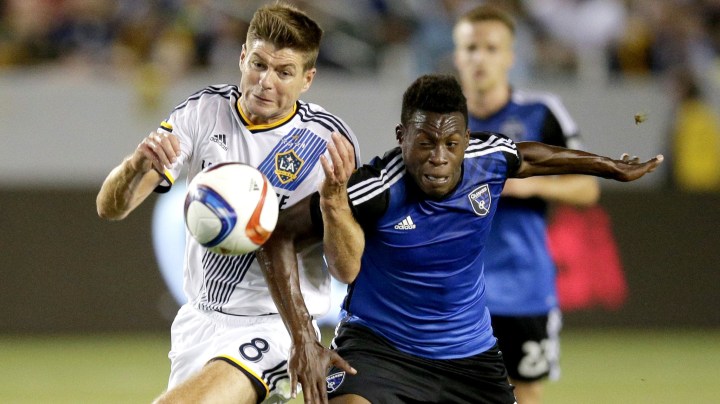The California Clásico Might Just Be Major League Soccer’s Best Rivalry

This weekend saw a number of fantastic MLS rivalries played out on the pitch. Canada’s 401 Derby resulted in a 2-1 win for Toronto FC over Montreal Impact, thanks to goals from Michael Bradley and Jozy Altidore, boosting the former’s unbeaten streak against their rivals to six. The New York Red Bulls took home the Atlantic Cup with a 3-0 drubbing of D.C. United, inching them closer to the top of the table. The Seattle Sounders battled their way to a 2-1 victory over the Portland Timbers in the always exciting and emotional Cascadia Cup, with goals from Obafemi Martins and Brad Evans.
While there’s no doubt that these heated rivalries get us psyched for soccer in the U.S., one rivalry stands above the rest in terms of its capacity to excite and inspire – San Jose Earthquakes vs. LA Galaxy. Northern vs. Southern Cali. A sporting and cultural rivalry that eclipses (most) others in the country. The California Clásico.

Curious as to how this rivalry got so big? Let’s take it back to 1859. The Pico Act, which would have split off the region south of the 36th parallel (landing just about midway between Monterey and San Luis Obispo), was actually approved by Congress and signed by then-governor John Weller. The reasoning behind it? Cultural and geographical differences, of course. Congress’ inability to act due to the onset of the Civil War was enough to deter and eventually stop the process, but the rivalry was only just beginning.
1992. The Statham Proposal was proposed by assemblyman Stan Statham, with the ultimate aim to split California into North, Central, and South Cali. The Senate denied the proposal. (Bills like this continue to underlie the relations between different regions of the state, so much so that venture capitalist Tim Draper is currently in the process of collecting 1.3 million signatures for a 2016 ballot measure that calls for splitting Cali into six separate states).
1996. San Jose and LA met each other for the first time in MLS action on April 28 of this year. The Galaxy secured a 2-1 win at the Rose Bowl. This year also marked the first-ever playoff meeting between the two sides, with the underdogs from the north heroically extending the series to three games before falling to the eventual league runners-up.
2003. Although the rivalry started to reach its peak as early as 2001, November 9 will forever be ingrained in the hearts and minds of fans from both sides, as well as MLS fans more generally, many of whom consider this date to mark the greatest game in league history. After winning the home leg of their playoff matchup 2-0, the Galaxy netted two goals in the early going of the second match to give themselves a comfy 4-0 cushion on aggregate. What happened next was miraculous and for all intents and purposes world-ending. San Jose completed a beyond-historic comeback with Rodrigo Faria (who had only made four regular season appearances), scoring six minutes into stoppage time to seal the deal.
2005. The two sides have combined for four MLS Cup titles in a five-year period. The intensity grew. The Galaxy blew past their enemies in playoff action, and did the same in 2012.
If you’re not yet excited to hear about the most recent edition of the best rivalry in the MLS, don’t worry – there’s more! On June 30, 2012, for example, San Jose produced what is arguably the best regular season game in league history. Wondo’s backheel shot past Josh Saunders was everything for the Quakes, who came from behind to win 4-3.
This thing is intense. Players are not easily forgiven by fans either, especially ones who’ve experienced life from both ends of the spectrum. Alan Gordon is one such player – after scoring last-minute gamekillers for the Quakes, he returned to action for the Galaxy in 2014. He literally had to buy fans beer to assuage their anger, and had to convince his son to change allegiances over the course of six long months.
This weekend’s edition of the Cali Clásico ended in a nail-biting 1-0 victory for San Jose. Geoff Lepper of MLSsoccer.com reported that “what Avaya Stadium’s first California Clásico lacked in goals, it made up for in angry passion.” Shea Salinas’ 18th minute goal was enough to give the Quakes their fourth straight shutout win and snap the Galaxy’s four-game winning streak, as he glided past Omar Gonzalez and into a practically open net to head home a rebound.
Until next time.